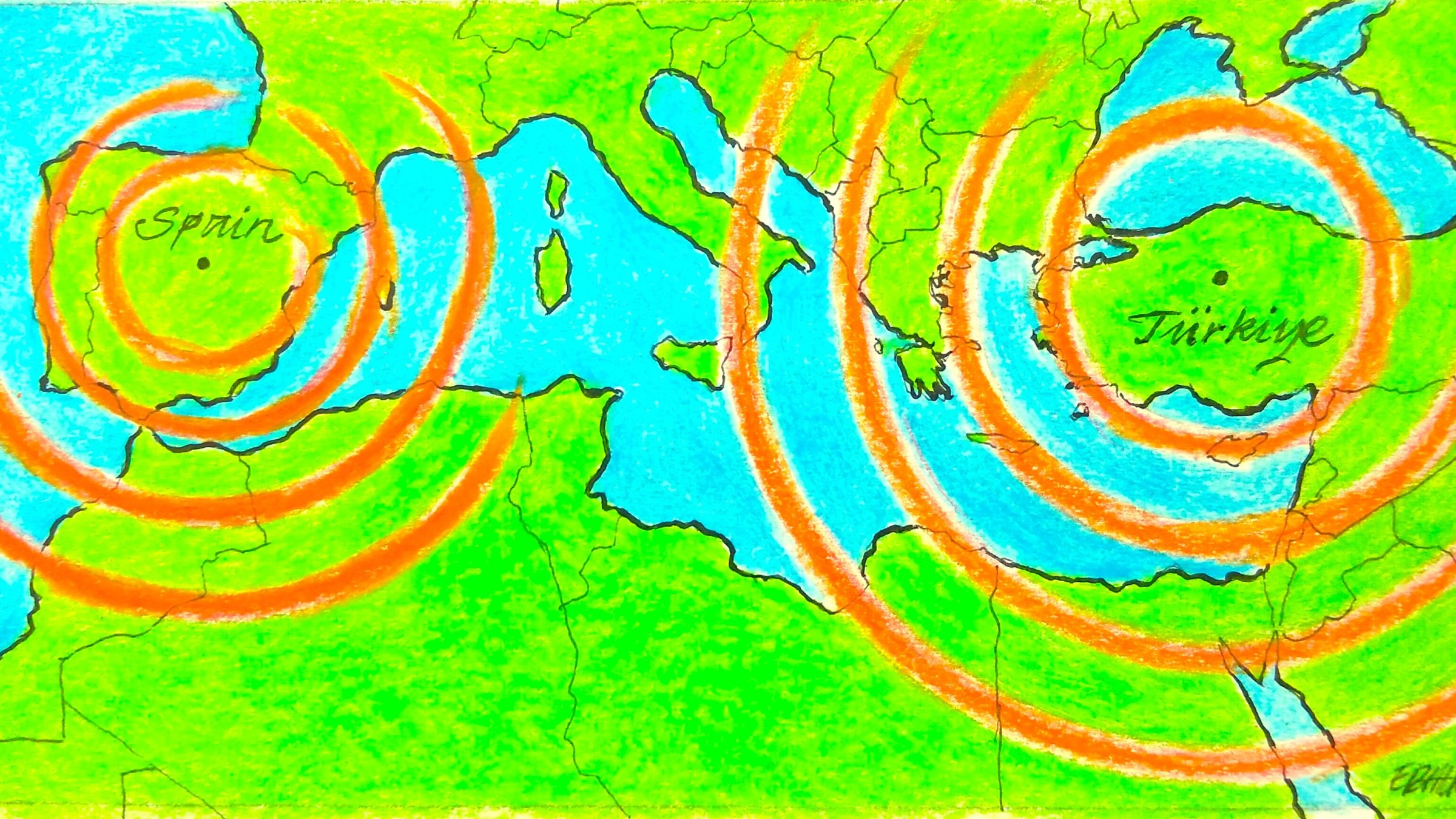Redrawing the map: Türkiye-Spain power corridor can reshape Mediterranean
Source: DAILYSABAH
The Mediterranean basin has always held immense geopolitical significance as the crossroads of Europe, Africa and Asia. In the near future, the emergence of a new power bloc centered on the Mediterranean, positioned against the West’s neo-colonial agenda, has the potential to disrupt the existing global balance of power fundamentally. This emerging alliance possesses all the essential assets: water, food, energy, defense, trade routes and tourism, needed for self-sufficiency, without relying on external powers. Before explaining the potential Türkiye-Spain bloc as a Mediterranean-centered alliance, it is important first to outline the current geopolitical landscape.
East Med deadlock
As of 2025, the Eastern Mediterranean has become one of the most intense arenas for competition in energy, defense and diplomatic influence. The maritime delimitation agreement signed between Türkiye and Libya has become one of the main pillars of Türkiye’s “Blue Homeland” strategy. This move has significantly disrupted the maritime sovereignty map that Greece, the Greek Cypriot administration, Israel and France had been trying to establish in the region.
The Türkiye-Libya Exclusive Economic Zone (EEZ) Agreement, signed on Nov. 27, 2019, redefined maritime jurisdictions in the Eastern Mediterranean and served as a strategic accord that legitimized Türkiye’s energy and political moves in the region. It encompasses both maritime delimitation and defense cooperation. Furthermore, the emergence of new land and border security agreements between Türkiye and Syria and the potential for a future EEZ accord in that direction expands Türkiye’s diplomatic reach and demonstrates its growing energy and defense capabilities, effectively making Türkiye a significant power in the Mediterranean.
In addition, as Türkiye expands across the corridor from the Mediterranean to Africa, it has signed formal EEZ agreements with Libya and the Turkish Republic of Northern Cyprus (TRNC), securing strategic dominance in the Eastern Mediterranean. Its energy corridor with Azerbaijan (TANAP-TAP), LNG and defense investments with Qatar, hydrocarbon exploration and naval infrastructure cooperation with Somalia and joint exclusive economic zone (EEZ) exploration and maritime training initiatives show Türkiye’s strategic maritime web. In Somalia, Türkiye was granted rights to explore oil, natural gas and fisheries; it is responsible for maritime security, naval training and coastal protection. With Sudan, there are security and energy cooperation agreements in place. Simultaneously, negotiations with Algeria and Tunisia on energy and defense are progressing. These developments demonstrate Türkiye’s establishment of a strategic network in energy access, offshore activities and maritime defense. In the summer of 2025, Türkiye also entered the process of forming a joint commission with Egypt.
Meanwhile, Greece, France and Israel have acted jointly to encircle Türkiye in the Eastern Mediterranean, asserting maximalist maritime claims and proposing the EastMed pipeline with the Greek Cypriot administration. France has engaged in active drilling operations through its energy firms and established military bases, while Greece fortified its defense lines around the Aegean and Crete and signed agreements with Egypt. Israel has pursued energy diplomacy with Greece and the Greek Cypriots via plans to export gas from the Leviathan and Tamar fields to Europe. It has also joined security alliances that exclude Türkiye. This tripartite bloc has developed political, military and energy-based partnerships aimed at preventing a Türkiye-centered balance of power in the Mediterranean.
However, while countries like Greece and France prioritize their own interests in such alliances, Türkiye has offered more attractive, mutually beneficial proposals to its partners. This has made Türkiye a more strategic, appealing and trustworthy ally in both economic and defense fields.
This dynamic strengthens Türkiye and its partners across the Eastern Mediterranean and at the intersection of Asia, Europe and Africa. Moreover, in the Mediterranean-Balkans corridor, Türkiye is working with Albania and Montenegro on maritime defense initiatives. Expanding this view, Türkiye’s deepening collaborations with Qatar, Pakistan and Azerbaijan highlight the remarkable progress in its trade and defense industrial route.
That is the current state. So, what should be done next to neutralize further the Greece-France-Israel axis, which poses a serious Western-backed security threat in the region? The answer lies in the partnerships between the Iberian and Maghreb regions.
A potential alliance
Spain, under the leadership of Prime Minister Pedro Sanchez, has been marginalized by the West for its peaceful and just stance on the Gaza genocide. At the same time, the U.S. has proposed that NATO countries increase their defense budgets to 5% of their gross domestic product (GDP), a move widely seen as a tactic to economically weaken EU states and force them to purchase American weapons. Sanchez rejected this demand, becoming the only leader to cross that red line, which led to backlash from the U.S. and his increasing isolation within the EU.
Spain is a highly fertile country with vast lands and mineral wealth, strong tourism potential and important trade routes. It has deep economic and cultural ties with Portugal and Morocco and holds considerable influence in both. This trio is forming a growing strategic bloc centered on renewable energy, migration, maritime security and trade.
In the coming period, the synergy between Spain’s emerging “Ibero-Moroccan” structure and Türkiye’s Mediterranean partnerships will give rise to a powerful form of Mediterranean dominance. If Spain, Portugal and Morocco join Türkiye’s current partnerships, especially with Libya, Syria, the TRNC, Algeria, Tunisia, Albania, Montenegro and other actors, a strong maritime axis will emerge with the potential to establish regional hegemony in the Mediterranean.
This bloc would serve as a corridor for trade, defense and energy from America to Europe, Africa and Asia, undermining the West’s colonialist practices, economic sanctions and destabilizing hegemony. Middle Eastern and Mediterranean nations would benefit from increased security and economic growth. With fertile lands, vital trade routes, strong energy resources and a tourism vision, this alliance, uniting the two edges of the Mediterranean, could soon become stronger than the existing EU.
China, which opposes U.S. hegemony, would also likely support this bloc from behind the scenes.
This coalition could yield numerous profitable projects. For example, integration of supply chains from North Africa to Europe and Asia could be achieved by connecting Türkiye’s Middle Corridor initiative with Morocco’s Tanger-Med Port and Spain’s Algeciras Port. Tanger-Med is Africa’s largest container port, and Algeciras serves as a gateway to Europe. Türkiye’s ports in Mersin, Izmir and Filyos serve as gateways to Central Asia and China. This route would promote safe and independent economic growth, free from Western control.
Additionally, Spain and Türkiye’s military capabilities, along with allies like Pakistan, contribute to a significant strategic presence.
Bloc of cooperation
Türkiye and Spain are friendly nations and allies in many fields. Notably, during the Gaza war, they stood against the West, condemned the genocide and recognized Palestine as a state.
Palestine is believed to possess unverified oil and gas reserves, and its strategic location along the Mediterranean coast adds to its geopolitical importance. It is widely acknowledged that the true motive behind the genocide, backed by the West and the U.S., is not only ideological but also driven by the desire to control these valuable lands and untapped resources. With international recognition of Palestinian statehood gaining momentum, energy exploration is expected to commence in the near future. In parallel, defense cooperation initiatives are likely to follow. As the regional dynamics evolve, Palestine is poised to align itself with Türkiye and join the emerging anti-hegemonic bloc challenging the axis of Western-backed aggression. This would significantly liberate Mediterranean dominance from the grip of colonial powers.
Recently, the Israeli prime minister stated, “We will not allow the return of the Ottomans.” He wasn’t just referring to Türkiye’s presence in Syria or the Middle East. He was pointing to the Ottoman dominance of the Eastern Mediterranean. Historically, power in this region has always passed through the Mediterranean.
This rich Mediterranean basin, at the crossroads of Europe, Africa and Asia, has always been vital. In the near future, the emergence of a new power bloc centered on the Mediterranean, opposing the West’s “neo-colonial” mission, could shift the current global power equation.
Such a union, formed by Türkiye and Spain combining their defense, energy and trade partnerships, could form a powerful alliance. Because this bloc would consist of geographically close nations, it would grow more efficiently and rapidly than distant groupings, such as BRICS.
The original article: belongs to DAILYSABAH .



